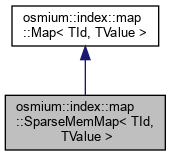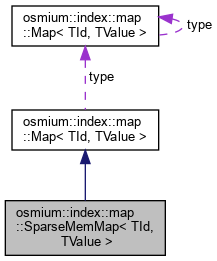#include <sparse_mem_map.hpp>


Public Member Functions | |
| SparseMemMap ()=default | |
| void | set (const TId id, const TValue value) final |
| Set the field with id to value. | |
| TValue | get (const TId id) const final |
| TValue | get_noexcept (const TId id) const noexcept final |
| size_t | size () const noexcept final |
| size_t | used_memory () const noexcept final |
| void | clear () final |
| void | dump_as_list (const int fd) final |
 Public Member Functions inherited from osmium::index::map::Map< TId, TValue > Public Member Functions inherited from osmium::index::map::Map< TId, TValue > | |
| Map () noexcept=default | |
| Map (const Map &)=delete | |
| Map & | operator= (const Map &)=delete |
| virtual | ~Map () noexcept=default |
| virtual void | reserve (const std::size_t) |
| virtual void | sort () |
| virtual void | dump_as_array (const int) |
Private Types | |
| enum | { element_size = sizeof(TId) + sizeof(TValue) + (sizeof(void*) * 4U) } |
Private Attributes | |
| std::map< TId, TValue > | m_elements |
Additional Inherited Members | |
 Public Types inherited from osmium::index::map::Map< TId, TValue > Public Types inherited from osmium::index::map::Map< TId, TValue > | |
| using | key_type = TId |
| The "key" type, usually osmium::unsigned_object_id_type. | |
| using | value_type = TValue |
| The "value" type, usually a Location or size_t. | |
 Protected Member Functions inherited from osmium::index::map::Map< TId, TValue > Protected Member Functions inherited from osmium::index::map::Map< TId, TValue > | |
| Map (Map &&) noexcept=default | |
| Map & | operator= (Map &&) noexcept=default |
Detailed Description
This implementation uses std::map internally. It uses rather a lot of memory, but might make sense for small maps.
Member Enumeration Documentation
◆ anonymous enum
Constructor & Destructor Documentation
◆ SparseMemMap()
|
default |
Member Function Documentation
◆ clear()
|
inlinefinalvirtual |
Clear memory used for this storage. After this you can not use the storage container any more.
Implements osmium::index::map::Map< TId, TValue >.
◆ dump_as_list()
|
inlinefinalvirtual |
Reimplemented from osmium::index::map::Map< TId, TValue >.
◆ get()
|
inlinefinalvirtual |
Retrieve value by id.
- Parameters
-
id The id to look for.
- Returns
- Value.
- Exceptions
-
osmium::not_found if the id could not be found.
Implements osmium::index::map::Map< TId, TValue >.
◆ get_noexcept()
|
inlinefinalvirtualnoexcept |
Retrieve value by id.
- Parameters
-
id The id to look for.
- Returns
- Value or, if not found, the empty value as defined by osmium::index::empty_value<TValue>() which is usually the default constructed value of type TValue.
Implements osmium::index::map::Map< TId, TValue >.
◆ set()
|
inlinefinalvirtual |
Set the field with id to value.
Implements osmium::index::map::Map< TId, TValue >.
◆ size()
|
inlinefinalvirtualnoexcept |
Get the approximate number of items in the storage. The storage might allocate memory in blocks, so this size might not be accurate. You can not use this to find out how much memory the storage uses. Use used_memory() for that.
Implements osmium::index::map::Map< TId, TValue >.
◆ used_memory()
|
inlinefinalvirtualnoexcept |
Get the memory used for this storage in bytes. Note that this is not necessarily entirely accurate but an approximation. For storage classes that store the data in memory, this is the main memory used, for storage classes storing data on disk this is the memory used on disk.
Implements osmium::index::map::Map< TId, TValue >.
Member Data Documentation
◆ m_elements
|
private |
The documentation for this class was generated from the following file:
- include/osmium/index/map/sparse_mem_map.hpp